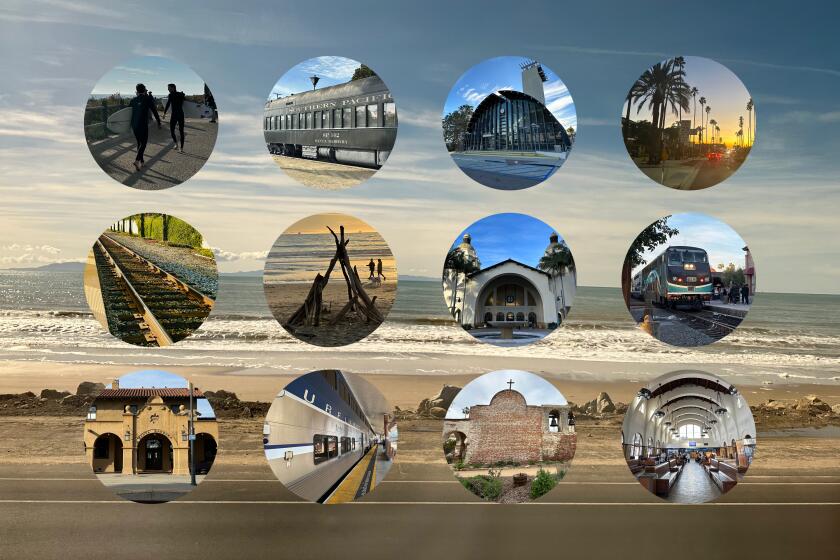20% off at Harry’s Bar? They’ll drink to that
To “the American victims” of the global financial crunch, as the sign outside Harry’s Bar puts it, a little relief is on order.
Arrigo “Harry” Cipriani, the dapper 76-year-old proprietor of one of Venice’s most famous watering holes, has taken pity on dollar-burdened American tourists. Exchange rates being what they are, that 15-euro Bellini now costs an American nearly $24, which probably works out to about a dollar a sip of the fizzy peach-flavored aperitif.
And so Harry is offering Americans a 20% discount on their bills -- sorry, drinks not included -- to ease them to fiscal recovery. Rejoice! That 37-euro ($58) hamburger will set you back only 30 euros.
It’s sympathy, yes, but also business. His American clientele has fallen off substantially since the dollar began plummeting faster than a pigeon diving for a piece of bread in nearby St. Mark’s Square.
“Europe has always been a wonderful place for Americans, the place they want to come for vacation,” said Cipriani, whose father in 1931 opened the bar, which later became a haunt of Ernest Hemingway and legions of literati and glitterati. “But now it’s expensive for everybody.”
The weak dollar and especially strong euro have sapped American buying power in Europe. And Venice, the historic city of canals that attracts 20 million visitors a year, is one of Italy’s most costly places.
So people are looking for deals. They are picnicking in the piazzas, despite a city ban on what it considers such indecorous behavior, and shortening their stays. (Overheard: two young American women deciding that a gondola ride, which can cost a couple of hundred bucks, was really not worth it -- unless you were getting a marriage proposal.)
Truth be told, visitors who dine at Harry’s Bar either aren’t too worried about their finances or aren’t too aware of just how high its prices are. They come for the celebrity quotient, maybe the impeccable service, certainly the spectacular panoramic views of the sparkling Venice lagoon.
On a recent weekday, business picked up slowly, and by early afternoon the place was more or less full. The only Italians appeared to be regulars, lingering over coffee and a newspaper, their first names known to the white-jacketed waiters. Everyone else was a tourist and probably an American.
In the ground-floor bar area, American couples in thick-soled tennis shoes sat at wooden tables, consulting their maps and looking for signs of Hemingway. A man in jeans and a navy blazer stood at the bar, talking with the bartender in much detail over the ingredients of an array of vodka cocktails.
Upstairs in the restaurant, in a sea of pale yellow linens and bone china, a group of American college women whispered over their menus. A well-heeled couple in the corner ordered a bottle of wine. Two couples, the men in red baseball caps, sat down, took one look at the menu and got up and left.
Many people were ordering the least expensive dishes on the menu: a croque-monsieur sandwich for 19 euros, or $30. Some salads or soups can be had for $46, but a plate of pasta will cost you $68. That’s before the discount, of course, which the restaurant deducts from the bill after hearing the diners’ accent.
Several of the people having lunch the other day weren’t aware of the discount, or hadn’t been until they read the sign posted at the front door, which is in English.
Ashley Johnson, 20, and a dozen other women from the University of South Carolina were seated at three tables, eager to eat at such a legendary place. Johnson said she found the exchange rate confusing and was slowly understanding that everything cost much more than she realized.
“I bought much more than I should have,” said Johnson, a fashion merchandising student. She was already worried about the credit card bills, but luckily she wouldn’t have to pay them: “My mother will be shocked.”
Janet Spina, who works in pharmaceutical sales, and Larry Ruizzo, vice president of a marketing company, are veteran travelers, and they knew what they were getting into when they came to Europe.
“We’re buying less, definitely,” said Spina, of Freehold, N.J. They are being selective, buying only the “beautiful things we can’t get at home,” she said.
“But I said, I’m going to have a Bellini at Harry’s!” Spina said. “You know, it’s just once.”
--
Sign up for The Wild
We’ll help you find the best places to hike, bike and run, as well as the perfect silent spots for meditation and yoga.
You may occasionally receive promotional content from the Los Angeles Times.




